List的使用
构造
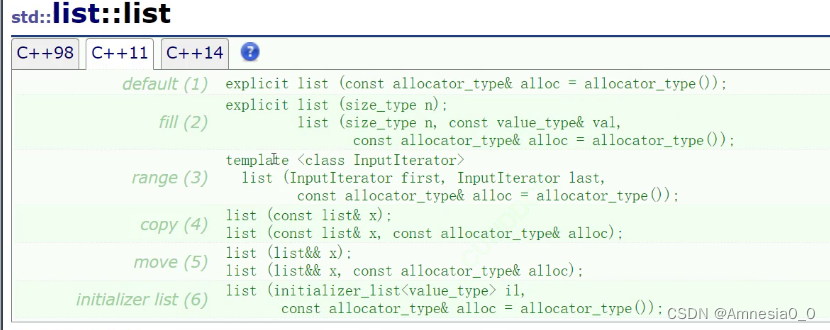
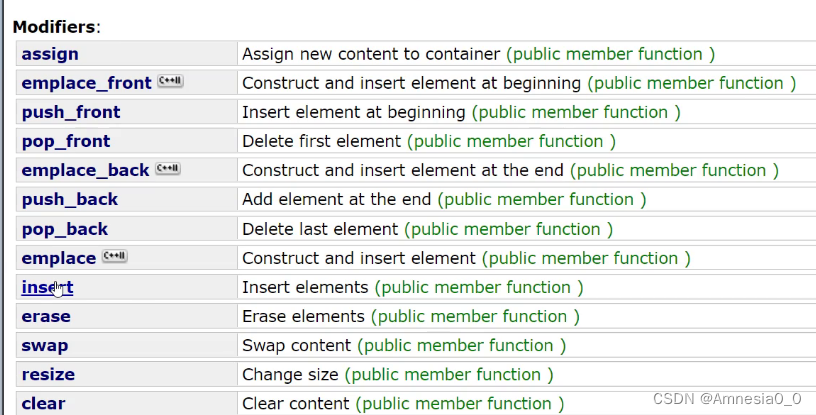
与vector的区别
与vector的区别在于不支持 [ ]
由于链表的物理结构不连续,所以只能用迭代器访问
vector可以排序,list不能排序(因为快排的底层需要随机迭代器,而链表是双向迭代器)
(算法库里的排序不支持)(需要单独的排序)
list存在vector不支持的功能

链表的排序
vector可以用算法库里的sort排序,list不能用算法库里的sort排序排序(因为快排的底层需要随机迭代器,而链表是双向迭代器)
(算法库里的排序不支持)(需要单独的排序)
链表的排序效率要远低于算法库里的快排,因此链表的sort很少使用
即使将list拷贝会vector排序再拷贝回来,效率依旧大于直接在list中排序
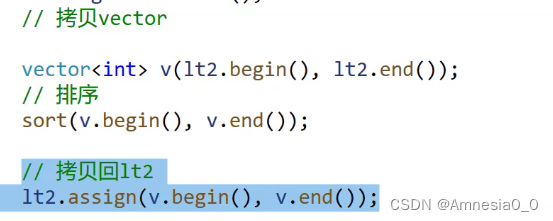
升序
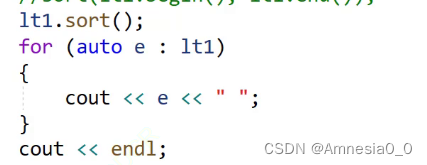
降序
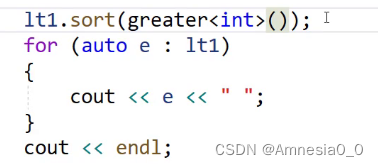
去重(unique)
去除多个重复的数据,每个值只留一个
但是去重有一个前提,需要先排序,否则去不全

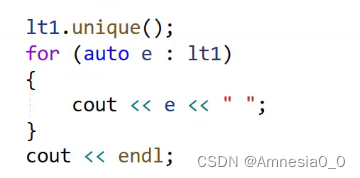
迭代器访问链表
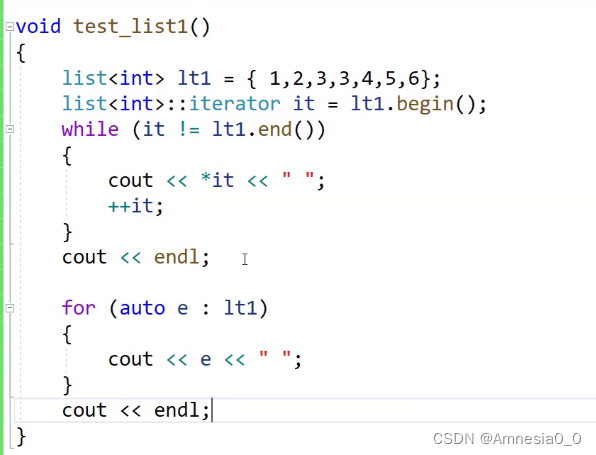
list的剪切
将一个链表的内容转移(剪切)到另一个链表

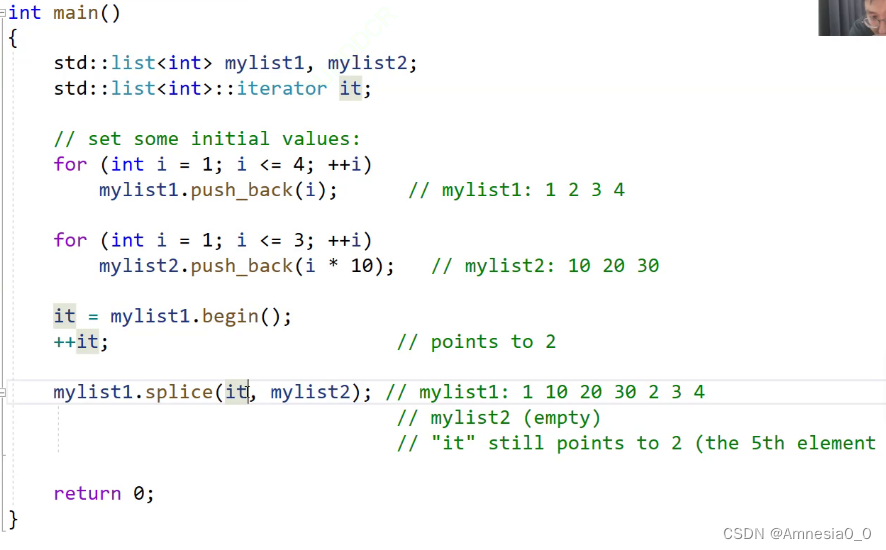
也可以自己剪切自己,来把某个节点向前或后移动
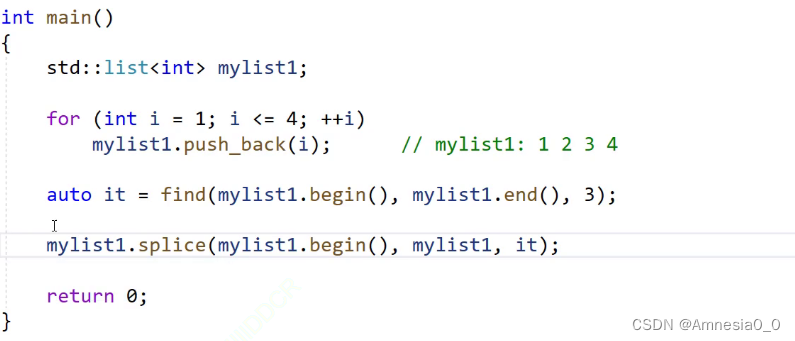
list变为"3 1 2 4"
List的实现(双向带头循环)
链表基础结构
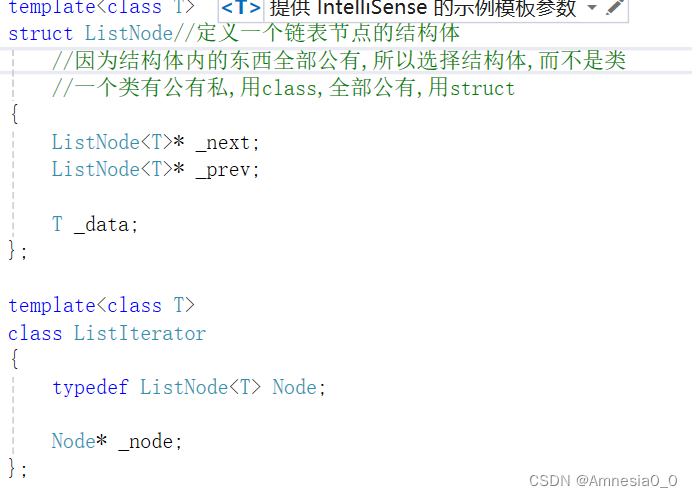
_head是双向带头循环链表的哨兵位(不存储有效数据)
list的迭代器
与vector不同,list在物理上是不连续的
因此不能像vector一样

因为这样++iterator不能得到下一个节点
因此可以选择建立一个类来进行封装
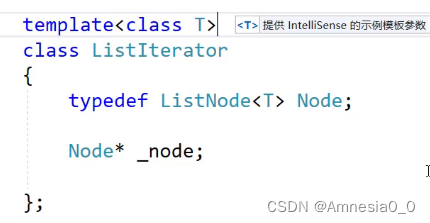
可以在该类中重载 " ++ " 和 " * "等运算符
是迭代器可以实现作用
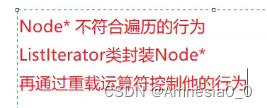
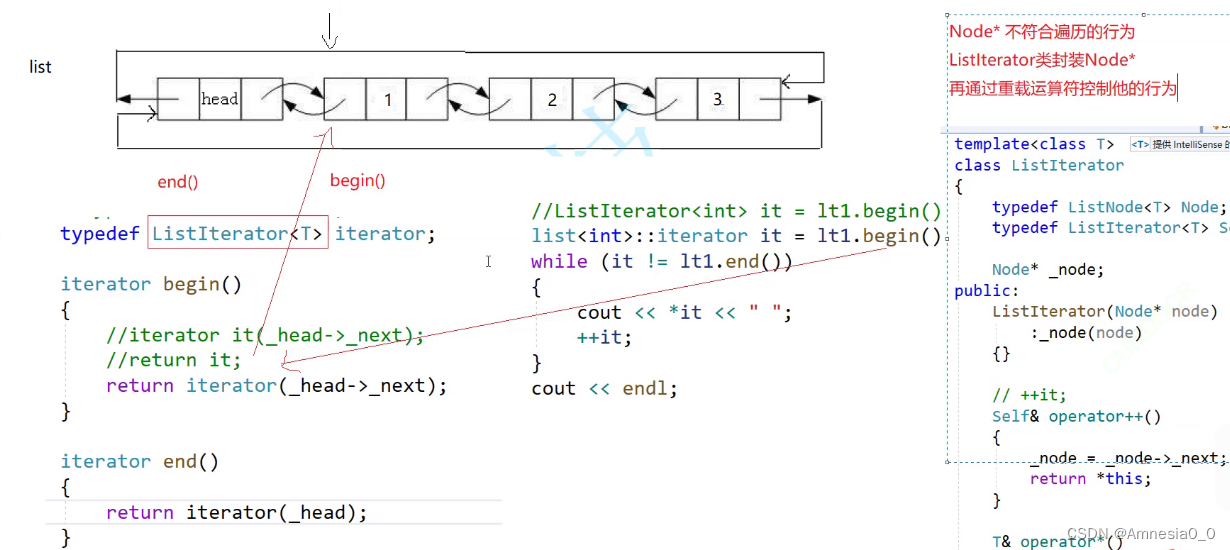
但是注意不需要重载 " + "和 " - " ,因为他们的效率很低
同时,迭代器类不需要写析构函数
因为节点不属于迭代器,只是需要用迭代器访问
节点是属于链表的
也不需要写拷贝构造(深拷贝),默认生成的浅拷贝就够了
因为没有写析构,所以也不存在析构两次的问题
->的重载
迭代器内还重载了 " -> "运算符
eg.
对于自定义类型
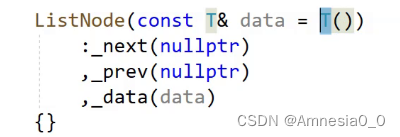
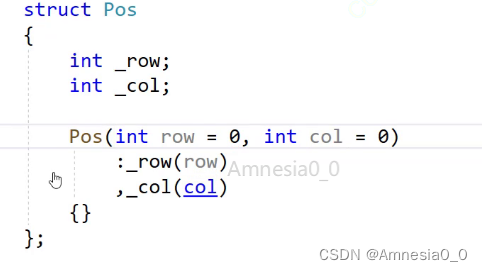
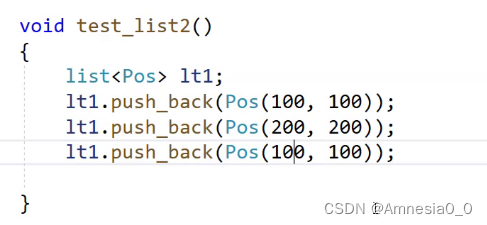
想要进行输出,又没有重载>>符号
方法一
比较原始的方法:

方法二
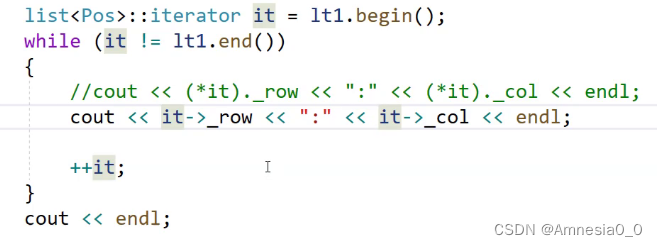
这里就是重载了 " -> "符号
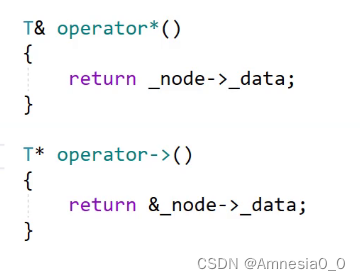
从逻辑上讲
方法2应该有两个->,但是为了代码的可读性,省略了一个->

const迭代器

采用引用传参一般会给参数加const,就产生了const迭代器
但是注意

所以需要单独写一个类,让迭代器可以修改,但它指向的内容不能修改(控制返回值)
该类与之前写的迭代器的类非常相似,唯一的区别就是operator* 和operator->的返回值不同
迭代器不能修改的核心行为是operator* 和operator->
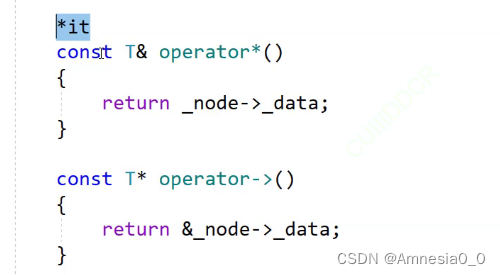
控制operator* 和operator->的返回值,从而达成不能修改的目的
但是,以上两个类重复度很高,重写一个类过于浪费
因此可以采取新添加两个模板参数

写一个类模板,传不同的模板参数,来控制返回值
这样相当于利用模板生成了两个类,交给编译器来完成
提高了开发效率
插入insert

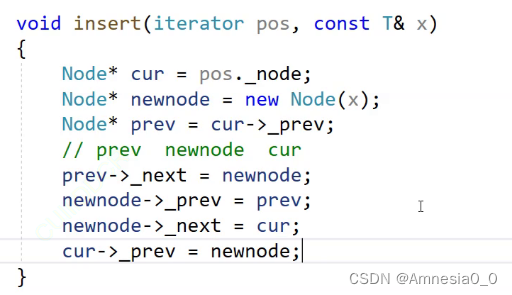
链表里的insert不存在迭代器失效的问题,因为它不存在扩容
pos指向的位置也不会变
删除erase
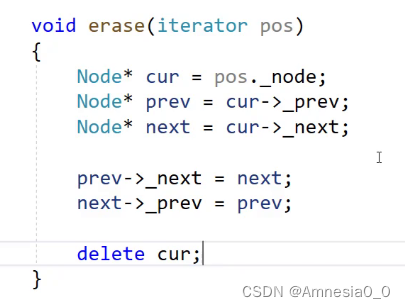
erase存在迭代器失效的问题
是野指针失效
拷贝
默认的浅拷贝存在一定的问题
eg.
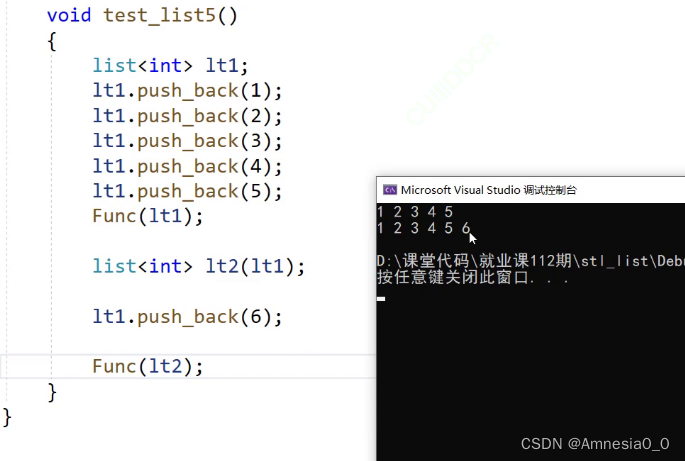
因为浅拷贝,指向同一块空间,会相互影响,析构两次
析构函数
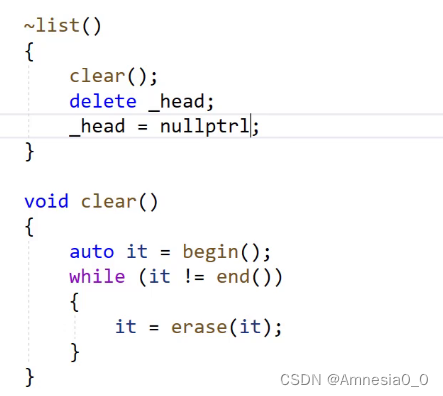
这里用clear()清除数据
深拷贝
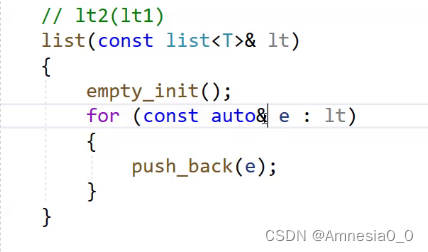
在范围for时,如果不确定遍历的类型,最好加引用&
赋值
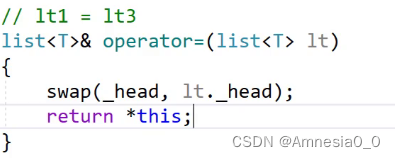
直接交换两个链表的头节点就行
因为传入的参数不是引用,lt是lt3的临时拷贝,使用完后就会释放
交换头节点后,不仅实现了赋值,还顺便将原链表析构了
initializer_list
为了支持{ }赋值,需要写一个initializer_list
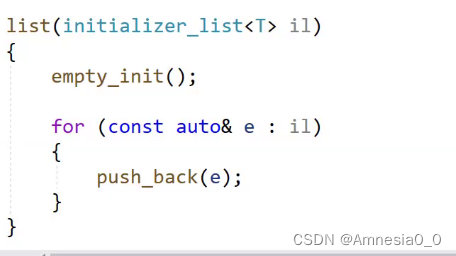
参数不用加引用&
因为initializer_list直接用{ }初始化,里面是常量数组
里面是直接用指针指向常量数组的开始和结束


模拟实现
cpp
#pragma once
#include <iostream>
using namespace std;
namespace bit
{
template<class T>
struct ListNode//定义一个链表节点的结构体
//因为结构体内的东西全部公有,所以选择结构体,而不是类
//一个类有公有私,用class,全部公有,用struct
{
ListNode<T>* _next;
ListNode<T>* _prev;//结构体指针后加<T>模板,否则结构体指针就无法指向该类型的数据
T _data;
ListNode(const T& data = T())//初始化
: _next(nullptr)
, _prev(nullptr)
, _data(data)//初始化列表
{}
};
template<class T, class Ref, class Ptr>
class ListIterator
{
typedef ListNode<T> Node;
typedef ListIterator<T, Ref, Ptr> Self;
Node* _node;
public:
//++it
ListIterator(Node* node)
:_node(node)
{}
Self& operator++()//前置
{
_node = _node->_next;
return *this;
}
Self& operator--()
{
_node = _node->_prev;
return *this;
}
Self operator++(int)//后置
{
Self tmp = *this;
_node = _node->_next;
return tmp;
}
Self operator--(int)
{
Self tmp = *this;
_node = _node->_prev;
return tmp;
}
Ref operator*()
{
return _node->_data;
}
Ptr operator->()
{
return &_node->_data;
}
bool operator!=(const Self& it)
{
return _node != it._node;
}
};
//template<class T>
//class ListConstIterator
//{
// typedef ListNode<T> Node;
// typedef ListConstIterator<T> Self;
// Node* _node;
//public:
// //++it
// ListIterator(Node* node)
// :_node(node)
// {}
// Self& operator++()//前置
// {
// _node = _node->_next;
// return *this;
// }
// Self& operator--()
// {
// _node = _node->_prev;
// return *this;
// }
// Self operator++(int)//后置
// {
// Self tmp = *this;
// _node = _node->_next;
// return tmp;
// }
// Self operator--(int)
// {
// Self tmp = *this;
// _node = _node->_prev;
// return tmp;
// }
// const T& operator*()
// {
// return _node->_data;
// }
// const T* operator->()
// {
// return &_node->_data;
// }
// bool operator!=(const Self& it)
// {
// return _node != it._node;
// }
//};
template<class T>
class list//链表
{
typedef ListNode<T> Node;
public:
typedef ListIterator<T, T&, T*> iterator;
typedef ListIterator<T, const T&,const T*> const_iterator;
/* typedef ListConstIterator<T> const_iterator;*/
iterator begin()
{
return iterator(_head->_next);//传入匿名对象构造一个iterator类型的变量来返回
}
iterator end()
{
return iterator(_head);
}
void empty_init()
{
_head = new Node();
_head->_next = _head;
_head->_prev = _head;
}
list()
{
/*_head = new Node(T());
_head->_next = _head;
_head->_prev = _head;*/
empty_init();
}
list(initializer_list<T> il)
{
for (const auto& e : il)
{
push_back(e);
}
}
//lt2(lt1)
list(const list<T>& It)//深拷贝构造
{
empty_init();
for (const auto& e : lt)
{
push_back(e);
}
}
//lt1 = lt3
list<T>& operator=(list<T> lt)
{
swap(_head, lt._head);
return *this;
}
~list()
{
clear();
delete _head;
_head = nullptr;
}
void clear()
{
auto it = begin();
while (it != end())
{
it = erase(it);
}
}
void push_back(const T& x)
{
Node* newnode = new Node(x);
Node* tail = _head->_prev;
tail->_next = newnode;
newnode->_prev = tail;
newnode->_next = _head;
_head->_prev = newnode;
}
void insert(iterator pos, const T& x)
{
Node* cur = pos._node;
Node* newnode = new Node(x);
Node* prev = cur->_prev;
prev->_next = newnode;
newnode->_prev = prev;
newnode->_next = cur;
cur->_prev = newnode;
return iterator(newnode);
}
void erase(iterator pos)
{
Node* cur = pos._node;
Node* prev = cur->_prev;
Node* next = cur->_next;
prev->_next = next;
next->_prev = prev;
delete cur;
return iterator(next);
}
private:
Node* _head;
};
void test_list1()
{
list<int> It1;
It1.push_back(1);
It1.push_back(2);
It1.push_back(3);
It1.push_back(4);
list<int>::iterator it = It1.begin();
while (it != It1.end())
{
*it += 10;
cout << *it << " ";
++it;
}
cout << endl;
}
}
